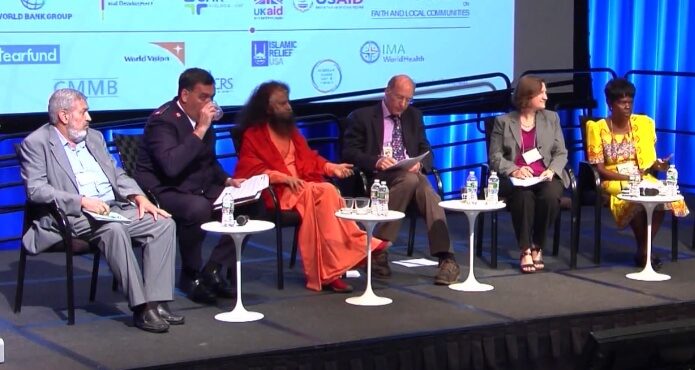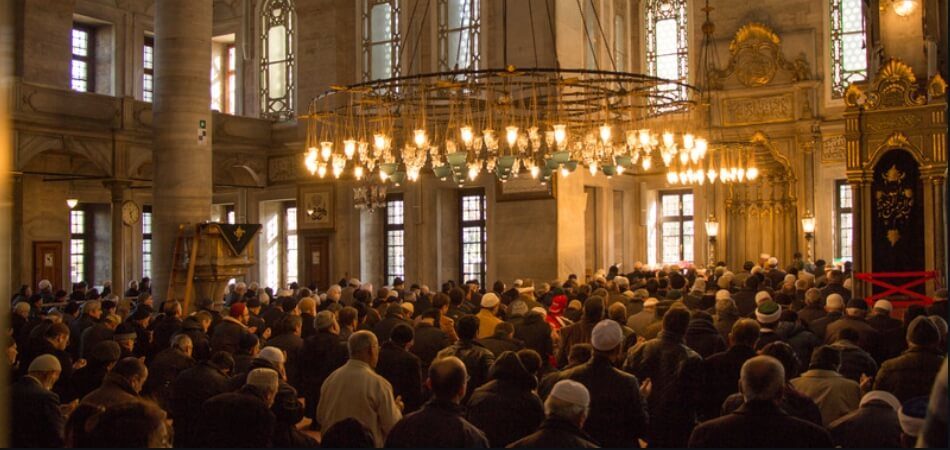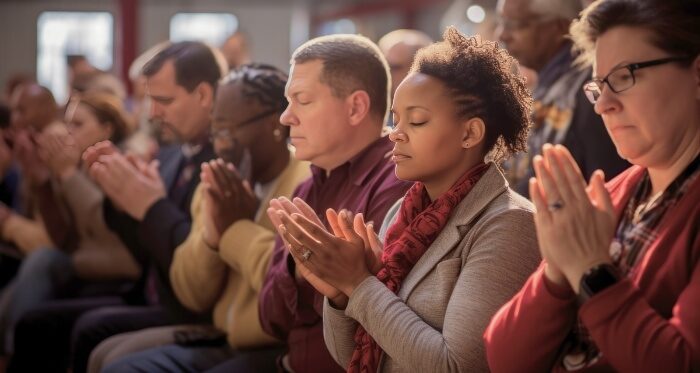Nowadays, developing mutual understanding and promoting peace across diverse religious and cultural lines is more crucial than ever. With this pressing need in mind, many wonder, “Who should attend religious studies and peace conferences?”
Religious Studies and Peace Conferences are beneficial for scholars, students, and educators interested in the intersection of faith and peace. Activists and community leaders seeking to promote dialogue and understanding among diverse groups should also attend. Additionally, anyone curious about conflict resolution and interfaith collaboration will find valuable insights and networking opportunities at these conferences.
Together, they hope to build bridges of understanding and chart a peaceful course for the world. In the following article, we’ll help you identify who should attend, the key purpose of the conference, and tips to find the right conference for you. So, without further ado, let’s begin, shall we?
What is a Religious Studies and Peace Conference?
Religious Studies and Peace Conferences are gatherings that explore the intricate relationships between faith, peace, and global understanding. They aim to develop dialogue, and promote unity and understanding Religious Studies and Peace Conference highlights the role of religion in peacebuilding. These conferences serve as essential platforms where scholars, theologians, and leaders can come together to discuss and analyze the tenets of various religions and their impact on global peace.

A Religious Studies and Peace Conference serves as a platform for scholars, theologians, and leaders to discuss and analyze the tenets of various religions and their impact on global peace. These events emphasize the role of interfaith dialogue in resolving conflicts, bridging divides, and building a harmonious future.
Attendees gain insights into the nuances of religious teachings and their potential in peace promotion, emphasizing collaboration and understanding between different faiths.
Types of Religious Studies and Peace Conferences
Religious Studies and Peace Conferences are crucial in promoting global unity and understanding. These gatherings vary in focus and methodology, addressing different facets of faith and peace. Understanding their diversity can offer clearer insights into their objectives and reach.
Interfaith Dialogues
These conferences aim to bridge gaps between various religions. Participants from different faith traditions come together, sharing beliefs and practices. Through dialogue, mutual respect and understanding are cultivated.
Theological Research Conventions
Researchers and scholars convene to analyze religious scriptures and teachings. They dissect theological tenets, exploring their implications for peace and harmony. Such in-depth studies pave the way for more informed peace initiatives.
Diplomatic Peace Summits
Diplomats and policymakers use these platforms to address faith-based conflicts. They strategize peace negotiations, relying on religious insights to guide resolutions. Their efforts ensure religion becomes a force for unity, not division.
Community Engagement Workshops
Grassroots leaders and community members gather in these setups. They engage in practical sessions, learning to support peace in local contexts. This direct community engagement is pivotal in ground-level peacebuilding.
Understanding the different types of Religious Studies and Peace Conferences underscores the multifaceted approach required to intertwine faith and peace. From scholarly research to diplomatic engagements, each type contributes uniquely to a harmonious global tapestry.
Who Should Attend Religious Studies and Peace Conferences?
Religious Studies and Peace Conferences invite a wide range of participants, creating an inclusive environment for diverse stakeholders. These events are rich in dialogue and insight, making them invaluable for many groups. Their collective participation ensures holistic solutions and widespread impact, contributing to a more harmonious world.
Religious Leaders
Spiritual heads and figures from various religious institutions find great value in attending these conferences. Their presence shapes conversations, adding authenticity and depth to discussions. Insights based on religious texts and practices are indispensable in these forums. Furthermore, attending such conferences allows them to engage with leaders from different faiths. This interaction promotes mutual respect and understanding, fostering a collaborative approach to peace.
Academics and Theologians
For academics and theologians deeply involved in research, these conferences provide fertile ground for sharing findings and challenging theories. They can collaborate on projects that explore religious principles and their potential for promoting global peace. Interacting with peers from various religious backgrounds broadens their perspectives and refines their research. This exposure helps make their work more inclusive and comprehensive, enriching the academic discourse.
Policymakers and Diplomats
Policymakers and diplomats play a critical role in addressing faith-based conflicts and diplomatic challenges. Attending these conferences equips them with nuanced knowledge that aids their mediation efforts. They gain insights into the religious facets of the conflicts they address, allowing for more effective solutions. On a broader scale, such conferences enable the creation of policy frameworks infused with religious understanding. This ensures peace initiatives resonate deeply with the communities involved.
Researchers and Enthusiasts
Researchers studying the interplay between religion and peace find these conferences invaluable. They gain firsthand experiences, observing interfaith dialogues and discussions. Their work benefits from the diverse voices and opinions present.
Similarly, enthusiasts passionate about interfaith understanding attend to enrich their knowledge. Their participation, driven by personal interest, adds a unique layperson’s perspective to discussions.
Community Leaders and Activists
Community leaders and activists are crucial attendees as they work on the ground to promote peace. Their experiences and challenges can inform discussions, leading to actionable solutions. These leaders often serve as bridges between communities, and their involvement can inspire others to engage in peace initiatives. Their voices help ensure that the conversations remain relevant to the needs of the community.
Students and Young Professionals
Students and young professionals interested in religious studies and peacebuilding should also consider attending. These conferences offer them a chance to learn from experienced practitioners and scholars. They can network with professionals and gain insights that shape their future careers. This exposure is valuable for personal and professional growth.
Religious Studies and Peace Conferences, with their inclusive nature, welcome a myriad of attendees. Their collective wisdom, experiences, and passion make these conferences melting pots of ideas, propelling the world toward a more harmonious future.
Key Purpose of Attending Religious Studies and Peace Conference
Religious Studies and Peace Conferences are crucial junctions where faith intersects with global harmony. Attendees come with diverse intentions, but several core purposes underpin these gatherings. Each of these purposes contributes to a wider, collective goal of global unity.
Promoting Interfaith Dialogue
Encouraging dialogue between different faiths is pivotal. It dispels misconceptions, facilitating mutual respect among diverse religious groups. Those who seek to learn and grow can greatly benefit when they attend religious studies and peace conferences. This ensures harmonious coexistence in multicultural societies and helps foster relationships that can lead to collaborative peace efforts.
Enhancing Academic Understanding
Academics get to present their research receiving constructive feedback. They gain insights into varied religious perspectives and practices. Such platforms refine academic endeavors, pushing the boundaries of religious scholarship.
Formulating Peace Strategies
Policymakers and diplomats strategize effective peace resolutions. They grasp the religious nuances underpinning many global conflicts. This aids in crafting policies that resonate deeply with conflicting parties.
Broadening Personal Perspectives
Individual attendees experience personal growth and enlightenment. Engaging in these dialogues sharpens their understanding of global religions. It makes them more empathetic, nurturing a broad-minded worldview.
Building Global Networks
Networking is a significant component of these conferences. Professionals forge connections with global counterparts, enabling collaborative projects. These networks often lead to impactful initiatives in peacebuilding.
Facilitating Grassroots Peace Efforts
Community leaders acquire tools and knowledge for ground-level peace initiatives. They learn best practices to address local, faith-based conflicts. Their efforts ensure peace permeates communities, reaching the masses.
The myriad purposes of attending a Religious Studies and Peace Conference mirror the complex tapestry of our global society. Each reason, whether academic, diplomatic, or personal, collectively pushes humanity closer to a future of understanding and unity.
Tips to Find the Right Religious Studies and Peace Conference
Navigating the myriad of Religious Studies and Peace Conferences can be challenging. Finding the one best aligned with one’s objectives requires a discerning approach. Here are some practical tips to guide your selection:
- Research the Organizers: Reputable organizations usually curate content-rich, impactful conferences. Review past events to gauge their dedication to promoting interfaith dialogue and peace.
- Check the Speakers’ Profiles: A diverse panel ensures multifaceted discussions. The credentials of the speakers can often indicate the conference’s depth and reach.
- Review the Agenda: The topics covered should resonate with your interests. A well-structured agenda promises organized discussions and comprehensive insights.
- Seek Recommendations: Networking can lead to valuable insights. Colleagues or peers in the field may offer recommendations based on their experiences.
- Evaluate Logistics: Consider the venue, date, and other logistical aspects. These factors can significantly influence the convenience and overall experience of the conference.
- Gauge Interactive Opportunities: Conferences that promote interaction support better learning. Look for sessions like workshops or Q&A segments for deeper engagement.
Finding the right Religious Studies and Peace Conference is akin to discovering a treasure trove of knowledge and networking. Using these tips ensures a rewarding and enlightening experience, making every moment count.
How to Make the Most Out of Attending a Religious Studies and Peace Conference
Attending a Religious Studies and Peace Conference can be a great opportunity for personal and professional growth. To ensure you benefit fully from the experience, consider the following tips. From preparation to networking, these strategies can enhance your participation.
- Prepare in Advance: Look over the conference agenda and choose sessions that interest you. Knowing the speakers and their topics will help you engage better. This preparation makes your experience more meaningful.
- Set Clear Goals: Think about what you want to achieve by attending. Whether it’s networking or learning about new ideas, having specific goals will keep you focused. This clarity will help you make the most of your time.
- Engage Actively: Participate in discussions and ask questions during sessions. Engaging with speakers and attendees deepens your understanding. It also allows you to connect with others on shared interests.
- Network with Others: Use the opportunity to meet new people. Introduce yourself to fellow participants and exchange contact information. Building relationships can lead to future opportunities.
- Dress Appropriately: Wearing the right clothes is important for conferences. Choose outfits that reflect your respect for the event. It’s essential to wear appropriate attire for religious studies and peace conferences to create a positive impression and feel comfortable during
Frequently Asked Questions
In this section, we address some common questions about Religious Studies and Peace Conferences. These FAQs provide clear and concise answers to help you understand what to expect from the event. Whether you are considering attending or want to learn more, these answers will guide you.
What is the purpose of a Religious Studies and Peace Conference?
The purpose of the conference is to explore the connections between religion and peace. It brings together people from different faiths to share ideas and promote understanding. The event focuses on how religious teachings can help resolve conflicts. Participants work together to find solutions to global issues.
Who can attend these conferences?
Anyone interested in the topics of religion and peace can attend the conference. This includes scholars, students, religious leaders, and activists. People from all faith backgrounds are welcome, as well as those without specific religious beliefs. The diverse participation enriches discussions and insights.
What types of sessions are held at the conference?
The conference features a variety of sessions, including keynote speeches, panel discussions, and workshops. These sessions cover different topics related to religion and peacebuilding. Participants can engage in discussions and ask questions to deepen their understanding. The format encourages active participation and learning.
How can I prepare for the conference?
Preparing for the conference involves reviewing the agenda and choosing sessions to attend. It helps to familiarize yourself with the speakers and their work. Setting personal goals for what you want to learn will keep you focused. Taking notes during sessions can also be beneficial for future reference.
What should I wear to the conference?
Choosing the right attire is important for attending the conference. Aim for professional and respectful clothing that reflects the event’s serious nature. Wearing appropriate attire for religious studies and peace conferences helps create a positive impression. Comfortable shoes are also recommended, as there may be walking or standing involved.
Wrap Up
In the context of faith and global harmony, the question, “Who should attend religious studies and peace conferences?” reverberates with heightened importance.
From religious leaders and academics to policymakers and enthusiasts, these conferences bridge gaps and enlighten minds across multiple domains. The significance lies not just in interfaith dialogues but also in the academic, diplomatic, and personal growth opportunities they present.
Their expansive reach means that anyone invested in building a peaceful, understanding world stands to benefit. Thus, in this diverse world, such conferences offer a beacon of hope, guiding humanity toward mutual respect and unity, ensuring that the very essence of religious love and understanding prevails.







